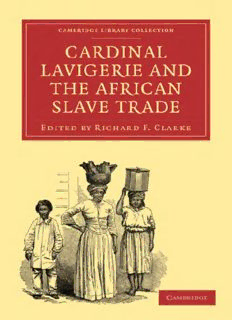
Cardinal Lavigerie and the African Slave Trade PDF
Preview Cardinal Lavigerie and the African Slave Trade
Cambridge Library CoLLeCtion Books of enduring scholarly value Religion For centuries, scripture and theology were the focus of prodigious amounts of scholarship and publishing, dominated in the English-speaking world by the work of Protestant Christians. Enlightenment philosophy and science, anthropology, ethnology and the colonial experience all brought new perspectives, lively debates and heated controversies to the study of religion and its role in the world, many of which continue to this day. This series explores the editing and interpretation of religious texts, the history of religious ideas and institutions, and not least the encounter between religion and science. Cardinal Lavigerie and the African Slave Trade In 1889 the Jesuit Richard F. Clarke published this biography of Charles Lavigerie (1825–1892), the French cardinal and Primate of Africa. From the moment of his arrival in Algeria in 1868, Lavigerie became a key, if sometimes controversial, figure in organising Catholic missions in Africa. In 1874 he founded the Society of Missionaries for Africa, otherwise known as the White Fathers after the white Arab dress they wore. Lavigerie’s later career was devoted to the battle against slavery and in 1888 he conducted a campaign in several European capitals denouncing the practice. Clarke’s book, which appeared a year after Lavigerie’s visit to London, provides an account of the cardinal’s career in France and Africa up to that date. It emphasises and praises Lavigerie’s anti-slavery message, referring to him in the preface as ‘the apostle of the slaves of all Africa.’ Cambridge University Press has long been a pioneer in the reissuing of out-of-print titles from its own backlist, producing digital reprints of books that are still sought after by scholars and students but could not be reprinted economically using traditional technology. The Cambridge Library Collection extends this activity to a wider range of books which are still of importance to researchers and professionals, either for the source material they contain, or as landmarks in the history of their academic discipline. Drawing from the world-renowned collections in the Cambridge University Library, and guided by the advice of experts in each subject area, Cambridge University Press is using state-of-the-art scanning machines in its own Printing House to capture the content of each book selected for inclusion. The files are processed to give a consistently clear, crisp image, and the books finished to the high quality standard for which the Press is recognised around the world. The latest print-on-demand technology ensures that the books will remain available indefinitely, and that orders for single or multiple copies can quickly be supplied. The Cambridge Library Collection will bring back to life books of enduring scholarly value (including out-of-copyright works originally issued by other publishers) across a wide range of disciplines in the humanities and social sciences and in science and technology. Cardinal Lavigerie and the African Slave Trade Edited by Richard F. Clarke CAMbRIDgE UnIvERSITy PRESS Cambridge, new york, Melbourne, Madrid, Cape Town, Singapore, São Paolo, Delhi, Dubai, Tokyo Published in the United States of America by Cambridge University Press, new york www.cambridge.org Information on this title: www.cambridge.org/9781108008334 © in this compilation Cambridge University Press 2009 This edition first published 1889 This digitally printed version 2009 ISbn 978-1-108-00833-4 Paperback This book reproduces the text of the original edition. The content and language reflect the beliefs, practices and terminology of their time, and have not been updated. Cambridge University Press wishes to make clear that the book, unless originally published by Cambridge, is not being republished by, in association or collaboration with, or with the endorsement or approval of, the original publisher or its successors in title. CAEDINAL LAVIG-EEIE AFRICAN SLAVE TRADE CARDINAL LAVIGKERIE AND THK .YFEICAN SLAVE TEADE Jr. EDITED BY EICHAED F. CLAEKE, S.J. TI1TXITY COLLECT, OXKuKD LONDON ONGMANS, GEEEN, AND Co. AND NEW YOEK : 15 EAST 1IV» STEEET 1880 .III ri\!ht< rm.-rre.l PREFACE ENGLAND has for a century and more taken her place in the forefront of the anti-slavery crusade. She has long since abolished slavery in all countries under her own sway. She has rejoiced over its abolition in the United States of America; her cruisers keep guard along the African coast to prevent, if possible, or at least to check, the export of slaves from thence : it is her earnest desire to penetrate into the heart of the African continent itself, and destroy the traffic in human flesh, with all its accompanying miseries. Various circumstances have hitherto combined to defeat her designs of mercy. The conflicting interests of the European Powers and the mutual hostility of Continental nations have rendered impossible the united action which alone could produce a permanent effect. The complications of the Eastern Question have entangled the position in Northern Africa. But, above all, the fierce opposition of Mohammedanism to any European interference with its career of conquest and of crime has succeeded in frustrating the efforts of the liberator, even when nominally supported by a Moham- medan Government. One expedition after another has failed in the face of the deadlv enmity of the Cre.-cent
Description: